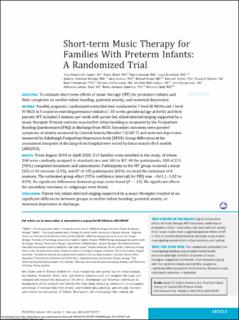| dc.contributor.author | Gaden, Tora Söderström | |
| dc.contributor.author | Ghetti, Claire | |
| dc.contributor.author | Kvestad, Ingrid | |
| dc.contributor.author | Bieleninik, Lucja | |
| dc.contributor.author | Stordal, Andreas Størksen | |
| dc.contributor.author | Assmus, Jörg | |
| dc.contributor.author | Shmuel, Arnon | |
| dc.contributor.author | Elefant, Cochavit | |
| dc.contributor.author | Epstein, Shulamit | |
| dc.contributor.author | Ettenberger, Mark | |
| dc.contributor.author | Lichtensztejn, Marcela | |
| dc.contributor.author | Lindvall, Merethe Wolf | |
| dc.contributor.author | Mangersnes, Julie | |
| dc.contributor.author | Janner, Catharina | |
| dc.contributor.author | Vederhus, Bente Johanne | |
| dc.contributor.author | Gold, Christian | |
| dc.date.accessioned | 2022-06-09T11:06:34Z | |
| dc.date.available | 2022-06-09T11:06:34Z | |
| dc.date.created | 2022-01-20T17:48:16Z | |
| dc.date.issued | 2022 | |
| dc.identifier.issn | 0031-4005 | |
| dc.identifier.uri | https://hdl.handle.net/11250/2998112 | |
| dc.description.abstract | OBJECTIVES
To evaluate short-term effects of music therapy (MT) for premature infants and their caregivers on mother-infant bonding, parental anxiety, and maternal depression.
METHODS
Parallel, pragmatic, randomized controlled-trial conducted in 7 level III NICUs and 1 level IV NICU in 5 countries enrolling premature infants (<35 weeks gestational age at birth) and their parents. MT included 3 sessions per week with parent-led, infant-directed singing supported by a music therapist. Primary outcome was mother-infant bonding as measured by the Postpartum Bonding Questionnaire (PBQ) at discharge from NICU. Secondary outcomes were parents’ symptoms of anxiety measured by General Anxiety Disorder-7 (GAD-7) and maternal depression measured by Edinburgh Postpartum Depression Scale (EPDS). Group differences at the assessment timepoint of discharge from hospital were tested by linear mixed effect models (ANCOVA).
RESULTS
From August 2018 to April 2020, 213 families were enrolled in the study, of whom 108 were randomly assigned to standard care and 105 to MT. Of the participants, 208 of 213 (98%) completed treatment and assessments. Participants in the MT group received a mean (SD) of 10 sessions (5.95), and 87 of 105 participants (83%) received the minimum of 6 sessions. The estimated group effect (95% confidence interval) for PBQ was −0.61 (−1.82 to 0.59). No significant differences between groups were found (P = .32). No significant effects for secondary outcomes or subgroups were found.
CONCLUSIONS
Parent-led, infant-directed singing supported by a music therapist resulted in no significant differences between groups in mother-infant bonding, parental anxiety, or maternal depression at discharge. | en_US |
| dc.language.iso | eng | en_US |
| dc.publisher | American Academy of Pediatrics | en_US |
| dc.rights | Attribution-NonCommercial-NoDerivatives 4.0 Internasjonal | * |
| dc.rights.uri | http://creativecommons.org/licenses/by-nc-nd/4.0/deed.no | * |
| dc.title | Short-term Music Therapy for Families With Preterm Infants: A Randomized Trial | en_US |
| dc.type | Journal article | en_US |
| dc.type | Peer reviewed | en_US |
| dc.description.version | publishedVersion | en_US |
| dc.rights.holder | Copyright 2022 by the American Academy of Pediatrics | en_US |
| dc.source.articlenumber | e2021052797 | en_US |
| cristin.ispublished | true | |
| cristin.fulltext | original | |
| cristin.qualitycode | 2 | |
| dc.identifier.doi | 10.1542/peds.2021-052797 | |
| dc.identifier.cristin | 1986700 | |
| dc.source.journal | Pediatrics | en_US |
| dc.identifier.citation | Pediatrics. 2022, 149 (2), e2021052797. | en_US |
| dc.source.volume | 149 | en_US |
| dc.source.issue | 2 | en_US |

